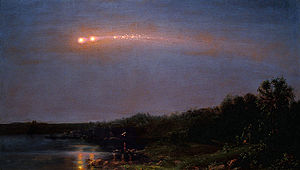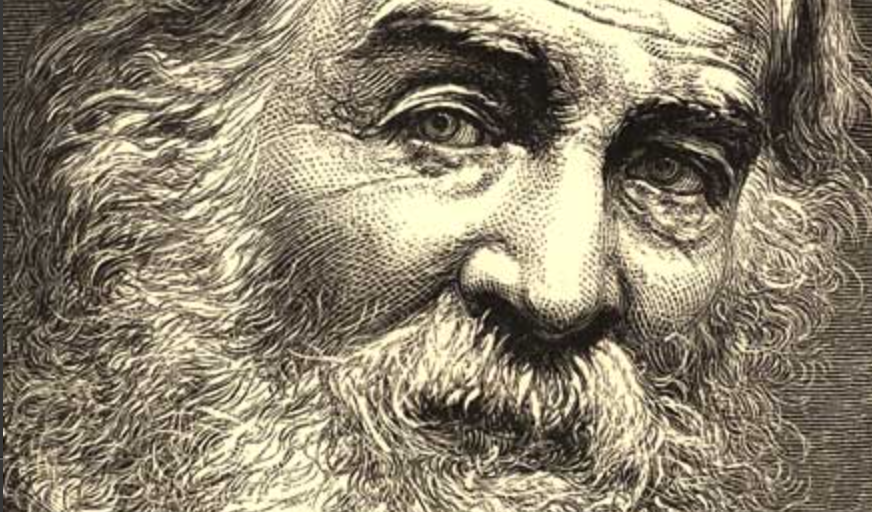What is a Great Meteor procession?
 July 20, 1860 — A phenomenon called the Great Meteor Procession occurred today in 1860 when a spectacular string of fireball meteors crossed the Catskill, NY sky.
July 20, 1860 — A phenomenon called the Great Meteor Procession occurred today in 1860 when a spectacular string of fireball meteors crossed the Catskill, NY sky.
Visible from locations across the US, it was later captured in a painting by American landscape artist Frederic Church (at right).
The event was also inspired the poem Year of Meteors, by Walt Whitman. (More here.)
Then on Feb. 9, 1913, another Great Meteor Procession was reported from locations across Canada, the northeastern United States, and Bermuda — and from ships at sea, including eight off Brazil, giving a total recorded ground track of over 7,000 miles (11,000 km).
Scientists explain that the meteors were particularly unusual in that there was no apparent radiant (no point in the sky from which the meteors appeared to originate). The observations were analysed in detail, later the same year, by the astronomer Clarence Chant, leading him to conclude that as all accounts were positioned along a great circlearc, the source had been a small, short-lived natural satellite of the Earth.
John A. O’Keefe, who conducted several studies of the event, proposed that the meteors should be referred to as the Cyrillids, in reference to the feast day of Cyril of Alexandria (February 9 in the Roman Catholic calendar, from 1882–1969).
Sources
Words of Wisdom
Year of Meteors • By Walt Whitman [http://www.whitmanarchive.org]
YEAR of meteors! brooding year! I would bind in words retrospective, some of your deeds and signs; I would sing your contest for the 19th Presidentiad; I would sing how an old man, tall, with white hair, mounted the
scaffold in Virginia; (I was at hand--silent I stood, with teeth shut close--I watch'd; I stood very near you, old man, when cool and indifferent, but trembling with age and your unheal'd wounds, you mounted the scaffold).I would sing in my copious song your census returns of The States, The tables of population and products--I would sing of your ships and their cargoes, The proud black ships of Manhattan, arriving, some fill'd with immigrants, some from the isthmus with cargoes of gold; Songs thereof would I sing--to all that hitherward comes would I welcome give; And you would I sing, fair stripling! welcome to you from me, sweet boy of England!
Remember you surging Manhattan's crowds, as you pass'd with your cortege of nobles? There in the crowds stood I, and singled you out with attachment; I know not why, but I loved you... (and so go forth little song, Far over sea speed like an arrow, carrying my love all folded,
And find in his palace the youth I love, and drop these lines at his feet;) Nor forget I to sing of the wonder, the ship as she swam up my bay, Well-shaped and stately the Great Eastern swam up my bay, she was 600 feet long, Her, moving swiftly, surrounded by myriads of small craft, I forget not to sing; Nor the comet that came unannounced out of the north, flaring in heaven; Nor the strange huge meteor procession, dazzling and clear, shooting over our heads, (A moment, a moment long, it sail'd its balls of unearthly light over our heads, Then departed, dropt in the night, and was gone;)
Of such, and fitful as they, I sing--with gleams from them would I gleam and patch these chants; Your chants, O year all mottled with evil and good! year of forebodings! year of the youth I love! Year of comets and meteors transient and strange!--lo! even here, one equally transient and strange! As I flit through you hastily, soon to fall and be gone, what is this book, What am I myself but one of your meteors?





